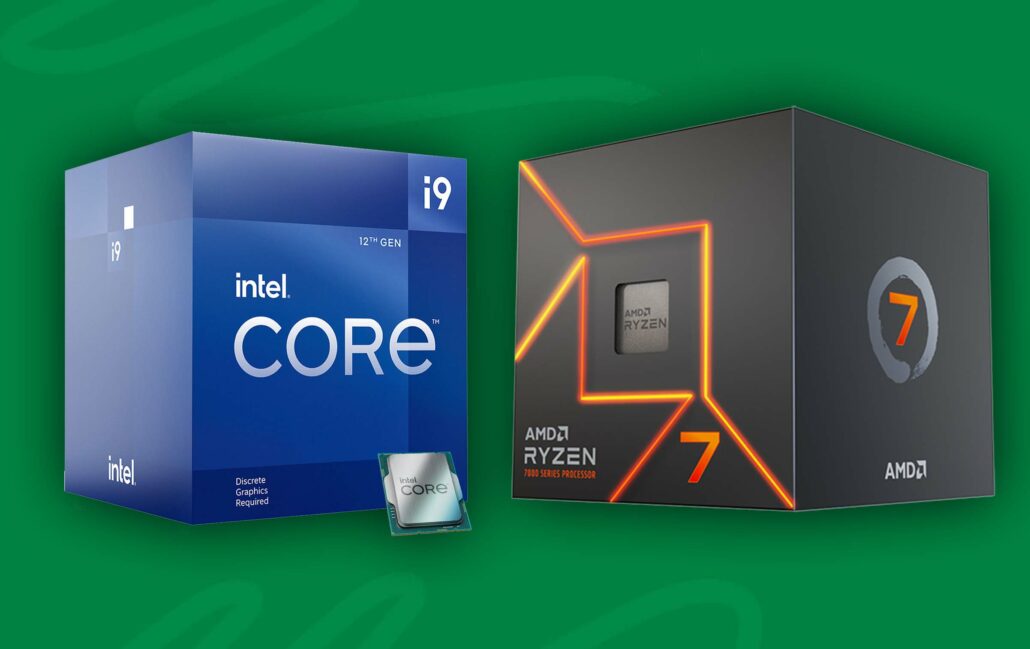When you face issues when planning to buy a CPU, you will have to decide which is better between AMD vs Intel. AMD vs Intel are both giants in the hardware industries. Additionally, Intel hardware is more popular among users because they have been the main provider of processors in user personal computers over the years.

Meanwhile, AMD has been a rival for Intel over the years. AMD produced integrated circuits in 1969, whereas Intel introduced its initial microprocessor in 1971. Intel gained greater prominence over AMD due to its partnership with IBM, supplying processors for IBM computers.
Additionally, AMD presents numerous processors with comparable capabilities to Intel’s offerings. Moreover, both companies continuously released a multitude of processors, engaging in competition.
What is the Difference between AMD vs Intel
AMD vs Intel are major CPU manufacturers. These differences include the architecture. AMD utilizes a modular design, placing on multithreading and integrated graphics. In addition, Intel offers a more traditional monolithic approach, presenting single-threaded performance.
The manufacturing processes employed by both companies differ, with AMD utilizing 7nm technology, while Intel has been in the process of transitioning from 14nm to 10nm. Performance and features variations exist among specific models from both brands.
Gaming Performance
Typically, Intel CPUs provide superior performance and value for gamers compared to AMD processors. When processing complex artificial intelligence (AI) in video games, Intel’s strengths like higher instructions-per-clock (IPC) and single-thread clock speed are crucial.
Additionally, AMD chips excel in core architecture designed for multitasking workloads instead of high-performance gaming. However, AMD chips are better than Intel based on enhancing your CPU and requesting games.
Price
In the higher price range, AMD tends to be less expensive than Intel processors. However, in the lower price range, Intel processors are generally more affordable than AMD counterparts. While Intel CPUs typically provide the best performance at mid-range price levels, advanced users with high demands and specialized software requirements may find AMD’s top-end chips more suitable.
Productivity and Performance
Professionals seeking performance in content creation and productivity applications often prefer Intel CPUs over AMD due to the strength of Intel’s x86 hybrid architecture. This design combines two types of cores to form a unified powerhouse processor architecture as it excels both in single-threaded tasks and in threaded applications.
Specification and Features
When comparing AMD and Intel CPU specifications, Intel provides options with lower prices, superior performance, and a more modern platform. Intel’s chips offer support for DDR4 memory, which holds significant importance, particularly in the initial stages of DDR5 adoption. However, AMD’s AM4 ecosystem has remained unchanged for six years, indicating its aging status in comparison.
Power Efficiency
When evaluating AMD vs Intel CPU performance per watt, it cannot overstate the significance of having the most compact process node combined with an efficient microarchitecture. In addition, TSMC’s 5nm technology and AMD’s Zen 4 architecture represent the best combination. The recent Ryzen processors from AMD consume less power compared to Intel counterparts when considering power versus performance metrics.
CPU Architecture
When comparing AMD and Intel CPU architectures, the competition has significantly narrowed in recent years. AMD’s Zen 3 architecture is a standout achievement, offering enhanced scalability and superior power consumption metrics thanks to its efficiency-focused design paired with the TSMC 7nm node.
Meanwhile, Intel’s Alder Lake architecture introduces a great combination of small, efficient cores and large performance cores to x86 desktop PCs, granting it a performance advantage. However, it’s not enough in power efficiency metrics, resulting in a draw in this part.
AMD vs Intel: Which CPU Is Better
Intel CPUs provide better performance for most users, particularly in gaming and productivity tasks, while maintaining accessible price points. The 13th-Gen Raptor Lake series introduces a combination of high-performance and efficiency cores, offering a balance between power and efficiency. However, Intel chips generally consume more power compared to AMD counterparts.
On the other hand, AMD’s Ryzen 7000 series, including specialized X3D models featuring 3D chip-stacking technology, leads in gaming performance. Recent price reductions and the introduction of new non-X models have lowered the entry price point. However, the premium associated with AM5 motherboards and DDR5 memory impacts the overall value proposition of AMD CPUs.
Furthermore, choosing between Intel and AMD CPUs depends on individual preferences regarding features, price, and performance requirements. For the fastest gaming CPUs, AMD’s Ryzen 7 7800X3D holds the best position, while Intel’s Raptor Lake CPUs are recommended for users seeking a balance between gaming and productivity tasks. It’s essential to consider compatibility with existing systems and future upgrade plans when making a decision.
Major Benefits of AMD vs Intel: Which CPU Is Better
Choosing between Intel vs AMD CPU depends on the individual’s specific needs and how they plan to use their computer. Intel has been known for its high-performance computing capabilities and has made significant advancements in its processors in recent years.
Additionally, they provide CPUs that offer similar performance to Intel’s, often with more cores and threads, all at a more affordable price point. Also, it’s important to note factors like price, intended usage of the computer, and compatibility with other hardware components.
